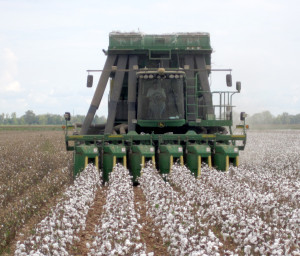College Station, Texas, USA
November 26, 2014
The annual “Replicated Agronomic Cotton Evaluation (RACE) for South, East and Central Regions of Texas” trial results are available to producers, according to Dr. Gaylon Morgan, Texas A&M AgriLife Extension Service state cotton specialist in College Station.

Results of the annual “Replicated Agronomic Cotton Evaluation (RACE) for South, East and Central Regions of Texas” trial are available. (Texas A&M AgriLife Extension Service photo by Dr. Gaylon Morgan)
“The sole objective of these trials is to provide cotton producers, consultants and the seed industry of the state with high quality and local cotton variety results,” Morgan said. “These trials are a cooperative effort between AgriLife Extension and cooperating cotton farmers, and would not be possible without financial support from the seed industry and Cotton Incorporated.”
AgriLife Extension has been conducting large-plot, on-farm, replicated variety trials for the past eight years to assist cotton producers in the Lower Rio Grande Valley, Blacklands, South Texas, Wintergarden and Upper Coastal Bend regions with production decisions, Morgan said.
Other AgriLife Extension personnel contributing to the variety evaluations include Dale Mott, program specialist in College Station; Dr. Josh McGinty, agronomist in Corpus Christi; county agents and integrated pest management agents.
Morgan said cooperating producers plant, harvest and manage the large-plot trials the same as the rest of their farm to ensure cotton yield and quality reflect the real-world management decisions and local conditions, including soil type and other yield influencing factors.
Producers can find the list of cooperators, planting and harvest dates, row spacing and plot area for each of the 21 Replicated Agronomic Cotton Evaluation trials planted in 2014 online at http://varietytesting.tamu.edu/cotton/. Results include yield, fiber quality and estimated lint value for each location, as well as rankings based upon lint yield for the varieties within a production region.
“The 2014 season began better this year than the past few, with adequate to excessive soil moisture at planting time,” Morgan said. “We had some isolated periods of heavy rains that, in general, delayed planting two to four weeks. The wet and cool conditions left many producers having to make some difficult decisions on whether to replant or stick with their current stand.”
Yields across the state were generally at or above average, primarily due to starting the season with a full soil profile of moisture and some timely rainfall during the growing season, Morgan said. Most locations did receive some rain on the crop just prior to harvest, which likely decreased lint grades, but minimal lint was removed from the bur and yield reductions were usually small.
Average irrigated yields ranged from 2,419 pounds per acre at the Weslaco location to 1,043 pounds per acre for the Corpus Christi location. The average dryland location yields ranged from 1,728 pounds per acre for Matagorda County to 598 pounds per acre for Dewitt County.
All the cottonseed companies with RoundupFlex or Glytol and Bt2 or Widestrike technology had the opportunity to include at least one variety in the RACE trial at each location. All varieties were treated with either Aeris or Avicta Complete Pak seed treatment. Included in the publication are the cotton variety descriptions provided by each company.
In addition to the RACE trials, two Monster Cotton Variety Trials, which are small-plot replicated trials in Hidalgo and Matagorda counties, were conducted, and the final yields and grades are also reported in the publication.
Anyone with questions or comments should contact Morgan at gmorgan@ag.tamu.edu or 979-845-2425.